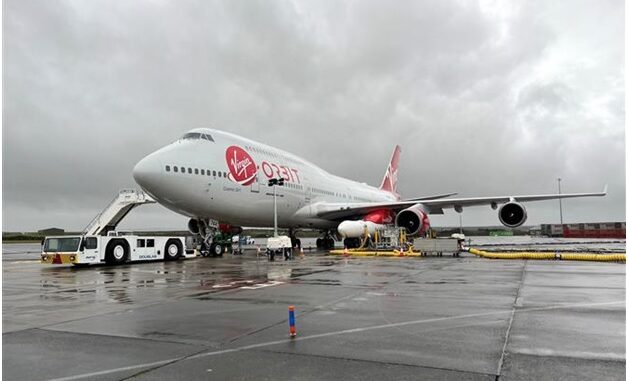
London (TIP): The first orbital satellite to set off for space from western Europe will be launched from Cornwall in southwest England on January 5. Virgin Orbit, part-owned by billionaire Richard Branson, who founded the Virgin Atlantic airline, plans to use a modified Boeing 747 with a rocket attached under its wing for the first time outside the company’s base in the United States.
Once the plane is at around 35,000 feet, the rocket will be released over the Atlantic, taking small satellites from seven customers into orbit in what is known as a horizontal launch.
The mission has been given a window for take-off from 2216 GMT on Monday but that is dependent on the weather plus other scheduling and system issues, and Virgin Orbit said there are back-up dates in mid and late January. A successful ground test known as a “wet dress rehearsal”, which involves fuelling the rocket inside a special safety zone, was held on Thursday, officials involved in the launch said. The idea of releasing a rocket from a converted jetliner, pioneered by Orbital Sciences in the 1990s, is designed to offer a flexible and low-cost route to orbit as the number of small satellites in low Earth orbit grows dramatically. The mission highlights an emerging small-launch sector just as Europe faces a growing crisis due to the Ukraine war, cutting access to Russian Soyuz vehicles, as well as Ariane 6 delays and the grounding of Vega rockets after a failed launch last month.
Britain has a large space industry employing 47,000 people, who build more satellites than anywhere outside the United States, but those have had to travel to spaceports in the United States, French Guiana or Kazakhstan before they can make it into orbit.
With two vertical micro-launch sites planned in Scotland, Britain now faces competition from Scandinavia and Germany in a new market for small launchers carrying miniature “cubesat” payloads to low Earth orbit, but believes it has an advantage due to its proximity to less congested oceanic airspace.
Even so, the launch was delayed in part due to the myriad regulatory clearances needed on the inaugural flight.
‘START ME UP’
“When you look at the way that the low Earth orbit economy is developing, it’s the place that everybody is looking to put their satellites, whether it be for climate change, observation or urban development, or indeed for security purposes,” Ian Annett, deputy CEO of the UK Space Agency told Reuters.
“The ability to access low Earth orbit with micro-launches is definitely not a static market – it is one that is continuing to grow,” he said.
The European Space Agency recently embraced the use of small launchers for some missions, though commentators such as Peter de Selding, co-founder of SpaceIntelReport.com, have questioned whether there is enough demand in Europe for multiple types.
(Reuters)



Be the first to comment